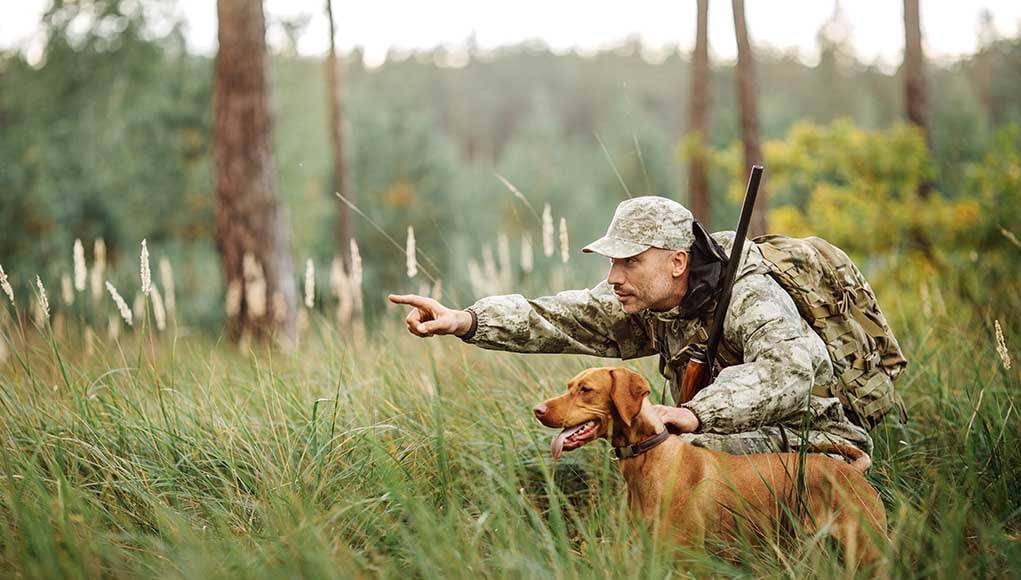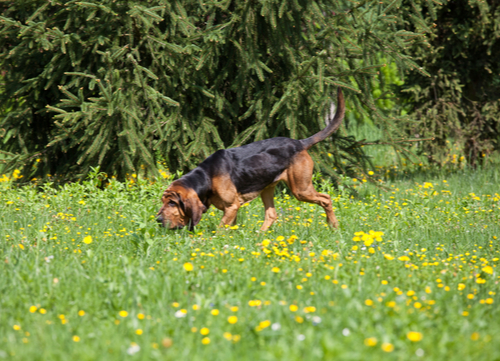Table of Contents
Humans and canines have been hunting together for a long time, probably ever since dogs were first domesticated. Hunting dogs share some common characteristics, whether they’ve been bred to hunt rabbits or wild boars.
Those commonalities include loads of stamina to chase and track all day, high trainability, excellent sense of smell or hearing, and lack of fear when facing danger.
Many of these traits that make great hunting dogs make them beautiful companions.
Whether you’re looking for a hunting partner or a buddy that loves the outdoors as much as you do, one of these thirteen best hunting dog breeds will likely check all the “must-haves” on your list.
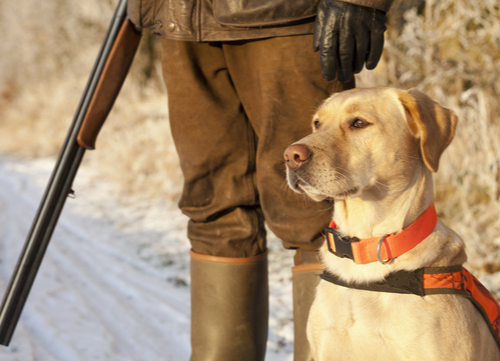
1. Labrador Retriever
This breed has been the top dog in the United States in popularity for an astounding 29 years straight, according to the American Kennel club rankings of registrations.
Theador Retriever offers keen intelligence, boundless energy, and excellent swimming skills.
As a hunting dog, Labrador Retriever has been successful in fields other than hunting. Incredibly hard workers, Labrador Retrievers have also served as companions and service assistance dogs.
They have also performed search-and-rescue work and drug and bomb detection as well.
They are loyal family members, loving small children and other dogs and people.
Their thick coat, which repels water and protects them in frigid temperatures, requires minimal grooming.
These dogs need a lot of daily exercises, so expect them to pursue chasing and retrieving with great zest.
In addition to hunting, they also excel in dog sports, including agility, obedience, and tracking.
An attractive trait that makes the Labrador Retriever such an effective bird dog is the “soft mouth” the breed shares with other retrievers and setters.
These dogs can learn through training to control their jaw strength to retrieve games without damaging it.
Some Labrador Retrievers have even learned to hold eggs in their mouths without cracking the shell—now, that’s control!
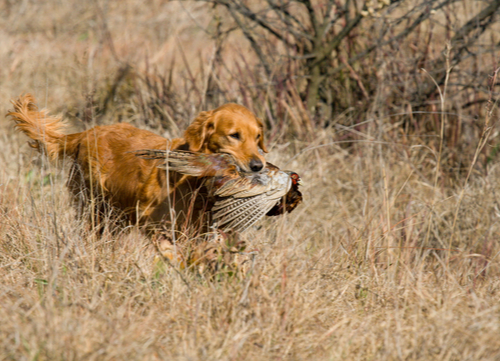
2. Golden Retriever
Another extremely popular dog in the United States, a Golden Retriever can adapt quickly to living in a home or going out on a hunting trail.
Cheerful, enthusiastic, and brilliant dogs have loads of stamina and are easy to train. Although Golden Retrievers specialize in bird hunting, they are severe workers in other fields. They have been employed as service and in search and rescue.
They make devoted, loving companions as well.
In the home, Golden Retrievers do well with children, other dogs, and are friendly to people outside of the family.
These dogs are eager-to-please, outgoing, and playful. Their thick, water-repellent coat requires regular brushing, with daily brushing during the heavy shedding times.
This breed needs excellent daily exercise. They enjoy swimming and fetching or can accompany active owners on bike rides, jogging, or hiking.
They also excel in dog sports like agility, obedience, and tracking. Like the Labrador Retriever, this breed also has a soft mouth.
3. Beagle
This is a mighty hunter in a compact package. Bred to hunt smaller prey like rabbits and foxes, Beagles in a pack can even take down small deer.
One of the best scent hounds globally, they can tirelessly follow a trail.
Bred as part of a pack, they enjoy company—human or canine. Loving and happy, they make good companions in the house.
With their loud bark, they are also effective watchdogs. Beagles are highly intelligent and relatively easy to train, although they can be stubborn.
Because of their energy level, Beagles need at least an hour of exercise a day. They can be walked on a leash or allowed to run in a fenced enclosure.
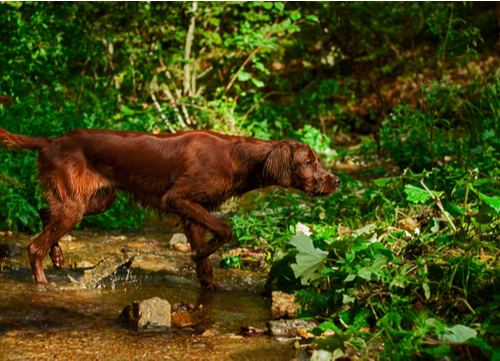
4. Irish Setter
This breed specializes in bird hunting. These dogs track the birds by scent and then “set” down to let the hunter know they’ve located the birds.
They are intelligent, determined, and adaptable hunters and have the soft mouth to carry game-like retrievers.
Affectionate and outgoing, these dogs do well with children, dogs, and people. Their lovely coat needs to be brushed at least twice a week.
Irish Setters, like most hunting dogs, need a lot of exercises. They enjoy playing fetch with their people or taking long daily walks.
They also excel in dog sports like obedience, tracking, and agility. Eager to please, they benefit from early socialization and ongoing training.
5. Bloodhound
While Bloodhounds were initially bred to track down large game by scent, today police departments all over the world use these large dogs to find missing people or those trying to escape.
Bloodhounds are easy-going, can work independently, and are relentless in following a scent.
They pursue a trail until it ends. No technology yet equals the accuracy of the Bloodhound’s nose.
As a companion dog, they are affectionate and loving. They do well with children and other dogs because they are accustomed to being part of a pack.
Maintenance of their coat is minimal—weekly brushing and regular baths to avoid a “doggy” odor—but they are droolers.
As with most hunting breeds, these dogs need regular exercise. Daily long walks on a leash where they can sniff around are ideal.
They can also play in a secure, fenced backyard. Beware of leaving them on their own for too long, though, because they are dedicated diggers and escape artists.
Obedience training with this breed can be challenging, so training and socialization need to start early. Bloodhounds are independent, and they can be stubborn.
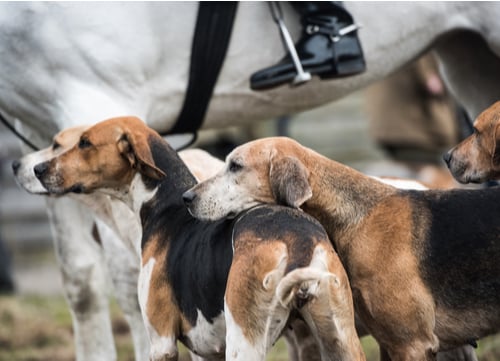
6. American Foxhound
As the name implies, the breed was developed to chase foxes but not to kill them. These dogs are also good all-around hunters of medium to large game, particularly deer.
They are accustomed to working long and hard, so they have a lot of stamina.
As companion dogs, they get along well with children, other dogs—and even cats. Their grooming needs are minimal; only brushing once a week.
However, they may fit better with more experienced dog owners because of their independence. They tend to bark readily, and you must manage their strong prey drive breed needs an hour or two of exercise every day, or the dogs may become bored or destructive. They enjoy long walks or hikes. American Foxhounds also excel in dog sports like tracking and coursing ability tests.
Because of their independence, sometimes housebreaking these dogs is a challenge. It’s best to start socialization and obedience training early.
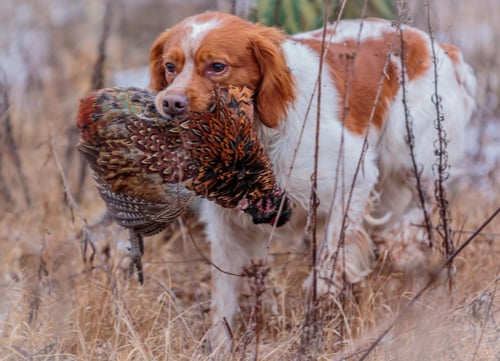
7. Brittany
This French dog breed falls somewhere between a spaniel and a setter.
The Brittany specializes in bird hunting, and they can handle duck, pheasant, partridge, and more. Their skills are versatile and include flushing, pointing, and retrieving.
Brittany is happiest with an outdoorsy, active owner. These dogs require minimal grooming, just regular brushing.
They are also highly trainable. Like most hunting breeds, the Brittany needs a lot of exercise.
These dogs enjoy long, fast walks, hikes, and runs on a leash next to their people. They also excel at agility competitions.
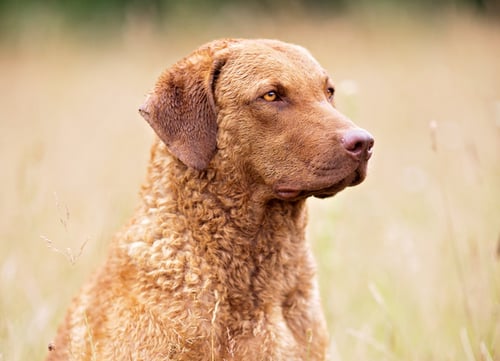
8. Chesapeake Bay Retriever
This breed was developed entirely within the United States. Athletic, with plenty of stamina, Chesapeake Bay Retrievers perform well in a wet environment.
Their specialty is bird hunting, especially waterfowl. Like other retrievers on this list, this breed also has a soft mouth. With a water-repellent, oily coat and webbed feet, excellent swimmers tolerate swimming in frigid water.
While they are skilled hunters, this breed has also been used as therapy dogs, search-and-rescue dogs, and bomb-detection dogs.
Intelligent and loyal, Chesapeake Bay Retrievers love their people, although they may be reserved with others.
Their grooming needs are minimal; a brushing about once a week is enough. This breed needs ample exercise and is happiest with a job.
They enjoy hiking, running and swimming. These dogs also excel in dog sports like obedience, tracking, and agility.
Since these retrievers can be independent, socialization and obedience training should start early.
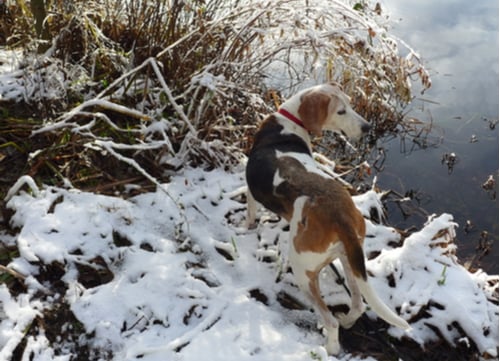
9. Treeing Walker Coon Hound
Besides the Treeing Walker, several types of coonhounds have been developed, including Bluetick, Black and Tan, Redbone, and American English. The Treeing Walker Coon Hound, as the name implies, can chase and tree prey, barking until the hunter arrives.
However, although “Walker” is part of the name, these rugged, determined dogs love to run. The Treeing Walker Coon Hound specializes in small to medium games.
These intelligent, sensible dogs make good running or hiking companions. They are low maintenance, requiring only an occasional bath.
Like most hunting breeds, this hound needs a lot of exercise. At a minimum, they need long daily walks. They also enjoy playtime with their owners and chasing balls.
These hounds can be stubborn and independent, so early socialization and training should start.
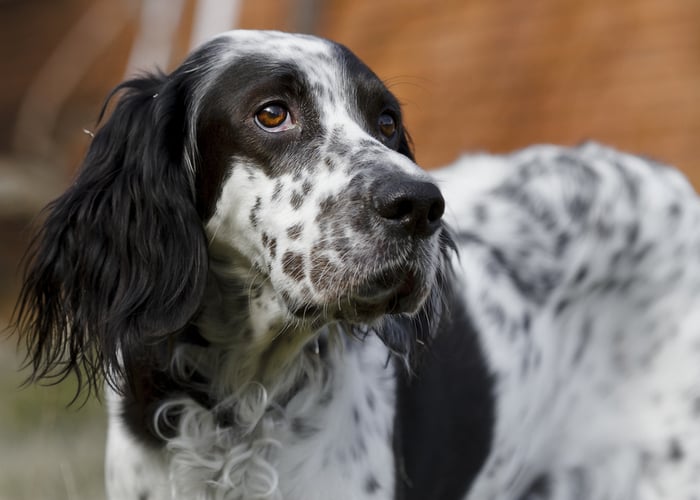
10. English Setter Hunting Dogs
As the name implies, this breed was developed in England 400 to 500 years ago. English Setters specialize in bird hunting.
They perform well on uneven ground and serve as runners and pointers. You can teach this breed to retrieve. Like the Irish Setter and various retrievers, the English Setter has a soft mouth.
These cheerful, friendly dogs make good companions. However, they need a fair amount of grooming because their long coat becomes easily tangled and dirty outside.
English Setters can be opportunistic as well, so owners need to keep people food away from them.
This breed enjoys a good run or playtime in a secure, fenced-in yard. Active owners can also take them on a leash for long walks, hikes, or bike rides.
English Setters have a strong prey drive, so early socialization and obedience training should begin.
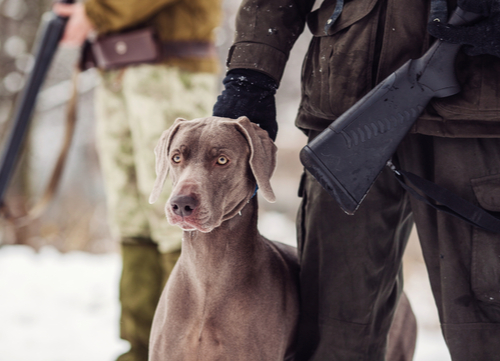
11. Weimaraner
Nicknamed the “Grey Ghost” for their speed and habit of sticking close to their people, Weimaraners are intelligent, athletic hunters.
Crossed with Bloodhounds and various German and French breeds, Weimaraners specialized in hunting large game.
They faced wolves, bears, and mountain lions. Later, as those populations declined, this breed focused on bird hunting.
Friendly and obedient, they make great companions and do well with children. Weimaraners are also low-maintenance, trainable dogs. They need a lot of exercise, preferably running in a safe, fenced area.
These dogs can be stubborn, so they benefit from early socialization and ongoing training.
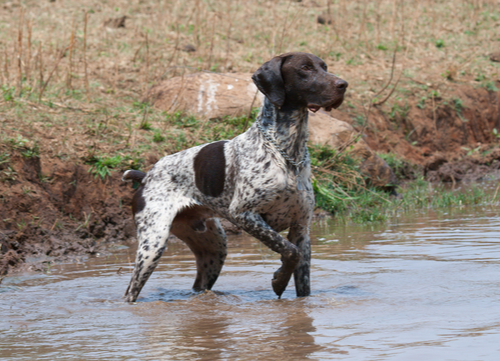
12. German Short-haired Pointer
Developed in Germany in the 1800s, this intelligent, determined dog specializes in bird hunting. A good swimmer with webbed feet, this dog can point, track at night, and retrieve from land or water.
In addition to birds, they can hunt possum, rabbit, raccoon, and deer.
These happy, trainable companions form strong bonds with their people. They need to be brushed every few days, more often when they are shedding.
This breed requires a lot of exercises and mental stimulation, at least twice a day. They enjoy brisk walks, running, and swimming with an owner who loves being outdoors and on the move.
Because of their high energy and strong prey drive, this breed needs early socialization and obedience training to engage them. Otherwise, they will get destructive if they are bored and alone.
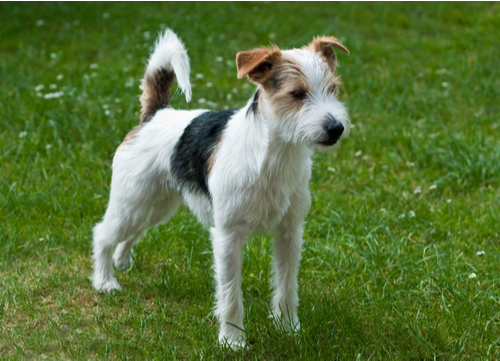
13. Jack Russell Terrier Hunting Dogs
Specializing in small games, this powerhouse’s energy far exceeds his size. Jack Russell Terriers were initially bred to hunt foxes and flush them from their burrows.
Intelligent and loving companions, this breed does well with children. These dogs require only minimal maintenance, perhaps a brushing once a week.
This small breed needs a lot of exercises to release all its energy. If you must channel that boundless energy, the dogs will engage in destructive behaviors.
They enjoy long daily walks with their people or running alongside a bike. These dogs also like playtime, which helps to stimulate their quick, active brains.
Jack Russell Terriers excel at dog sports, including agility, flyball, obedience, and lure coursing.
Since these terriers have a strong prey drive, they require early socialization and obedience training. They become bored quickly, so the activity must be engaging.
A dog from any of these thirteen breeds can make a skilled hunting partner as well as a devoted companion.


